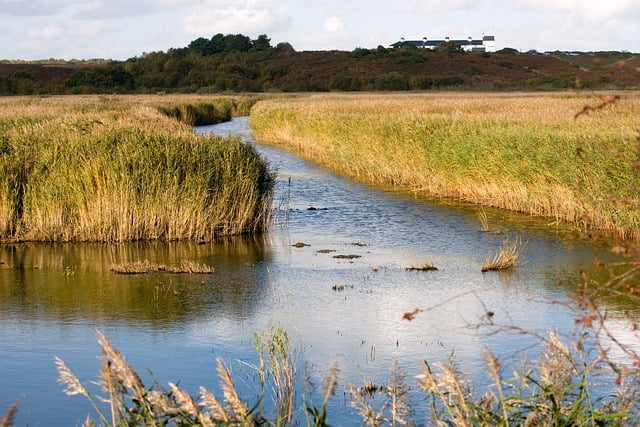
Environmental Consultant Suffolk
IPPTS Environmental Consultant Suffolk, East Anglia, UK: Services Offered
Environmental consulting services in Suffolk are indispensable for businesses, property developers, and local government officials looking to comply with environmental regulations and enhance sustainability.
This guide will detail the variety of services offered by environmental consulting firms in Suffolk, how to choose the best firm, and how to effectively work with a consultant to achieve your goals.
Some Examples of Environmental Consulting Services Available in Suffolk
Environmental consulting firms in Suffolk offer a range of services to address various environmental concerns and compliance requirements.

Key services include:
Environmental Assessments(EIA)
Environmental assessments are comprehensive evaluations of the environmental impact of a proposed project. These assessments identify potential environmental risks and provide recommendations for mitigating those risks. Services typically include:
Top 7 Project Types in the UK That Mandate an Environmental Impact Assessment (EIA)
1. Large-Scale Residential Developments
Activities Involved:
- Construction of housing estates, apartment complexes, and new townships in Suffolk.
- Land clearance and significant alterations to the landscape.
Rationale:
Large-scale residential projects can lead to substantial habitat loss, increased traffic, pollution, and strain on local infrastructure. An EIA ensures that potential negative impacts on the environment and local communities are assessed and mitigated.
2. Major Infrastructure Projects
Activities Involved:
- Development of highways, railways, airports, and ports
- in Suffolk.
- Extensive use of heavy machinery and potential disruption to existing ecosystems.
Rationale:
Infrastructure projects often span large areas and can disrupt natural habitats, water courses, and air quality. EIAs help in identifying and reducing adverse environmental impacts, ensuring sustainable infrastructure development in Suffolk.
3. Industrial and Manufacturing Plants
Activities Involved:
- Construction and operation of factories, refineries, and processing plants.
- Emission of pollutants, waste generation, and resource consumption in Suffolk.
Rationale:
Industrial activities can significantly impact air and water quality, contributing to pollution and health hazards. An EIA assesses these risks and promotes measures to minimize environmental damage in Suffolk..
4. Energy Projects (Wind Farms, Solar Parks, etc.)
Activities Involved in Suffolk:
- Installation of wind turbines, solar panels, and associated infrastructure.
- Land use changes and potential effects on local wildlife and habitats.
Rationale:
While renewable energy projects are essential for reducing carbon emissions, they can still affect local environments. An EIA evaluates impacts on wildlife, landscapes, and local communities, ensuring balanced development.
5. Waste Management Facilities
Activities Involved:
- Construction and operation of landfills, recycling plants, and incinerators in Suffolk.
- Handling and processing of large volumes of waste materials.
Rationale:
Waste management activities pose risks of contamination, odor, and pollution. EIAs help in assessing and managing these impacts, promoting effective and environmentally sound waste management practices.
6. Suffolk Mining and Quarrying Operations
Activities Involved:
- Extraction of minerals, ores, and other geological materials.
- Significant land disturbance, water use, and potential pollution.
Rationale:
Mining and quarrying can have profound effects on local landscapes, water resources, and ecosystems. An EIA ensures that these activities are conducted responsibly, with measures in place to mitigate environmental harm.
7. Agricultural Intensification in Suffolk
Activities Involved:
- Large-scale farming operations, including livestock and crop production.
- Use of fertilizers, pesticides, and irrigation systems.
Rationale:
Intensive agricultural practices can lead to soil degradation, water pollution, and loss of biodiversity. EIAs help in evaluating these impacts and promoting sustainable agricultural practices that protect the environment.
By understanding these project types and the necessity of EIAs, developers and stakeholders can better navigate the regulatory landscape, ensuring that their projects contribute to sustainable development while minimizing environmental harm.

Compliance Audits
Compliance audits are crucial for ensuring that businesses and projects adhere to local, national, and international environmental regulations. These audits help identify areas of non-compliance and recommend corrective actions. Services include:
Top 5 Project Types in the UK That Require a Compliance Audit
Compliance audits are crucial for ensuring that projects adhere to legal regulations, industry standards, and internal policies. In the UK, certain types of projects are more likely to necessitate a compliance audit due to their complexity, regulatory requirements, and impact on stakeholders. Below is a numbered list of such project types, along with a description of the activities involved and the primary rationale for requiring a compliance audit for each type.
1. Construction Projects
Activities Involved:
- Site surveys and risk assessments
- Obtaining planning permissions and building permits
- Health and safety management
- Environmental impact assessments
- Quality assurance and control
Rationale for Compliance Audit:
Construction projects in the UK must comply with a myriad of regulations, including the Building Regulations, Health and Safety at Work Act, and environmental legislation. A compliance audit ensures that all legal and regulatory requirements are met, minimizing the risk of legal penalties and ensuring the safety and well-being of construction workers and the public.
2. Financial Services Projects
Activities Involved:
- Implementation of new financial products or services
- Data protection and cybersecurity measures
- Anti-money laundering (AML) and know-your-customer (KYC) procedures
- Financial reporting and disclosures
Rationale for Compliance Audit:
Financial services projects must adhere to stringent regulations set by bodies such as the Financial Conduct Authority (FCA) and the Prudential Regulation Authority (PRA). A compliance audit such as for SSAFO ensures that financial institutions follow these regulations, thereby protecting consumers, maintaining market integrity, and avoiding significant fines and reputational damage.
3. Healthcare Projects
Activities Involved:
- Implementation of patient care systems
- Data recording and management
- Clinical trials and research
- Procurement of medical supplies and equipment
Rationale for Compliance Audit:
Healthcare projects are subject to regulations from bodies like the Care Quality Commission (CQC) and the Medicines and Healthcare Products Regulatory Agency (MHRA). Compliance audits ensure that healthcare providers meet these standards, safeguarding patient safety, ensuring data protection, and maintaining the efficacy of medical treatments and services.
4. Information Technology (IT) Projects
Activities Involved:
- Software development and deployment
- Data storage and management
- Network security measures
- User privacy protections
Rationale for Compliance Audit:
IT projects must comply with regulations such as the General Data Protection Regulation (GDPR) and the Network and Information Systems (NIS) Regulations. A compliance audit ensures that IT systems are secure, data is protected, and user privacy is maintained, thereby preventing data breaches and other cybersecurity threats.
5. Environmental and Sustainability Projects
Activities Involved:
- Implementation of green technologies
- Waste management and recycling programs
- Energy efficiency measures
- Environmental impact assessments
Rationale for Compliance Audit:
Projects aimed at improving environmental sustainability must comply with regulations from bodies like the Environment Agency and adhere to laws such as the Environmental Protection Act. Compliance audits ensure that these projects meet regulatory standards, thereby protecting the environment and promoting sustainable practices.
Conducting compliance audits for these types of projects is essential to ensure adherence to regulatory standards, mitigate risks, and enhance project outcomes. By prioritizing compliance, organizations can avoid legal penalties, safeguard their reputation, and contribute to the well-being of society and the environment.
By focusing on these key areas, organizations in the UK can better understand the importance of compliance audits and take proactive steps to ensure their projects meet all necessary requirements.
Sustainability Planning
Sustainability planning services help organizations develop strategies to improve their environmental performance and reduce their ecological footprint. These services include:
Our range of services is designed to address various aspects of environmental, social, and economic sustainability. Below is a detailed list of the sustainability planning services IPPTS Suffolk Consults provides to its clients:
1. Sustainability Audits
Sustainability Audits Suffolk
We conduct thorough sustainability audits to evaluate your current practices and identify areas for improvement. Our audits cover energy usage, waste management, water conservation, and more, providing a comprehensive overview of your environmental impact.
2. Carbon Footprint Analysis
Carbon Footprint Analysis Suffolk
Understanding your carbon footprint is the first step toward reducing it. We offer detailed carbon footprint analysis services that measure your greenhouse gas emissions and provide actionable insights to lower your carbon output.
3. Renewable Energy Integration
Renewable Energy Suffolk
Transitioning to renewable energy sources can significantly reduce your environmental impact. We assist in the planning and implementation of solar, wind, and other renewable energy solutions tailored to your specific needs.
4. Sustainable Supply Chain Management
Sustainable Supply Chain Suffolk
A sustainable supply chain is crucial for minimizing environmental impact and ensuring long-term viability. We help businesses optimize their supply chains by sourcing sustainable materials and engaging with eco-friendly suppliers.
5. Green Building Consultancy
Green Building Suffolk
We offer green building consultancy services to help you design and construct environmentally friendly buildings. Our experts guide you through the entire process, from planning to execution, ensuring compliance with LEED and other green building standards.
How to Identify and Select the Best Environmental Consulting Firms in Suffolk
Choosing the right environmental consulting firm is critical to the success of your project. Here are key criteria to consider:
Qualifications
Ensure that the consulting firm has the necessary qualifications, including relevant certifications and accreditations. Look for firms with consultants who hold professional designations such as Certified Environmental Professional (CEP) or Chartered Environmentalist (CEnv).
Experience
Experience is a strong indicator of a firm’s capability. Look for firms with a proven track record in your industry and a history of successful projects in Suffolk. Request case studies and examples of previous work to assess their expertise.
Client Testimonials
Client testimonials and reviews provide valuable insights into a firm’s reliability and performance. Look for positive feedback from previous clients and ask for references to speak with directly.
Actionable Tips for Briefing an Environmental Consultant
Effective collaboration with your environmental consultant is essential for achieving optimal results. Follow these tips to ensure a productive partnership:
1. Clear Communication
Establish open and transparent communication with your consultant from the outset. Clearly articulate your project goals, expectations, and any specific concerns you may have.
2. Setting Specific Goals
Define clear, measurable goals for your project. This helps the consultant understand your priorities and tailor their services to meet your specific needs. For example, if you aim to achieve a certain level of energy efficiency, specify the percentage reduction you are targeting.
3. Understanding Regulatory Requirements
Familiarize yourself with relevant environmental regulations and standards that apply to your project. This knowledge enables you to provide accurate information to your consultant and ensures compliance with legal requirements.
Other Pages About East Anglia Consultants
Suffolk Environmental Consultancy Case Studies and Examples
Let’s look at a few examples to illustrate the value of environmental consulting services in Suffolk:
Example 1: Brownfield Redevelopment
A property developer in Suffolk hired an environmental consulting firm to conduct a Phase I and Phase II ESA on a brownfield site. The assessments identified soil contamination, and the consultant provided a remediation plan to clean up the site, allowing the developer to proceed with construction safely.
Example 2: Compliance Audit for a Manufacturing Plant
A manufacturing company in Suffolk engaged an environmental consultant to conduct a compliance audit. The audit revealed several areas of non-compliance with environmental regulations.
The consultant recommended corrective actions, and the company implemented changes that not only ensured compliance but also improved operational efficiency.
Conclusion: A Step-by-Step Process for Engaging with Environmental Consultants in Suffolk
Follow this step-by-step process to engage with an environmental consultant effectively:
- Identify your specific environmental needs and project goals.
- Research and shortlist qualified environmental consulting firms in Suffolk.
- Evaluate firms based on qualifications, experience, and client testimonials.
- Request proposals and conduct interviews with potential consultants.
- Select the firm that best matches your requirements and establish clear communication channels.
- Define specific, measurable goals and ensure mutual understanding of regulatory requirements.
- Regularly review progress and provide feedback to the consultant to ensure alignment with project objectives.
By following this guide, you’ll be well-equipped to select and work with an environmental consultant in Suffolk, ensuring your project meets sustainability and compliance goals effectively.
Welcome to Our Environmental Consulting Services in Suffolk
Expert Environmental Consultants in Suffolk
Our team of environmental consultants in Suffolk specializes in providing a range of services to help businesses navigate environmental regulations and mitigate environmental impact.
Frequently Asked Questions
What services do environmental consultants in Suffolk offer?
Environmental consultants in Suffolk offer a range of services including environmental impact assessments, contaminated land assessments, and environmental permitting assistance.
How can an environmental consultant help my business?
An environmental consultant can help your business by ensuring compliance with environmental regulations, identifying potential risks, and providing solutions to mitigate environmental impact.
What qualifications should I look for in an environmental consultant?
Look for an environmental consultant with relevant experience, certifications, and a track record of successful projects in Suffolk.
How much does it cost to hire an environmental consultant in Suffolk?
The cost of hiring an environmental consultant in Suffolk can vary depending on the scope of the project and the services required. It is best to request a quote for a specific project.
How long does it take to complete an environmental assessment with a consultant?
The timeline for completing an environmental assessment with a consultant can vary depending on the complexity of the project. It is best to discuss timelines with the consultant before starting the project.
What are the benefits of hiring a local environmental consultant in Suffolk?
Hiring a local environmental consultant in Suffolk can provide a better understanding of local regulations, resources, and potential environmental issues specific to the area.
How can I get started with hiring an environmental consultant in Suffolk?
To get started with hiring an environmental consultant in Suffolk, contact our team for a consultation to discuss your project needs and goals.
Contact Us
Reach out to our team today via the email form on this page to learn more about our environmental consulting services in Suffolk and to schedule a consultation.


You must be logged in to post a comment.